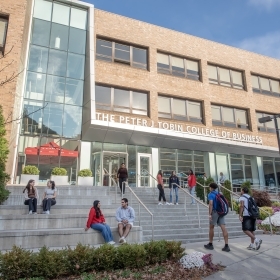Best Undergraduate Degrees for Pursuing an M.S. in Neuroscience

Deciding which master’s degree to pursue can feel daunting.
If you’re interested in science, neuroscience is a growing field with expanding career opportunities. According to the US Bureau of Labor Statistics, Bureau of Labor Statistics jobs for medical scientists (including neuroscientists) are expected to grow by 17 percent between 2021-31. This growth rate is much faster than the average for all professions, which makes pursuing a Master of Science (M.S.) degree in Neuroscience appealing for many.
What is Neuroscience?
Neuroscience focuses on the brain—both its behavioral and cognitive functions—and how people think. There are three main subsets of neuroscience.
Cognitive Neuroscience
memory, thought processing, language, problem solving
Developmental Neuroscience
how the brain forms, grows, and changes
Molecular/cellular Neuroscience
genes, proteins, and how neurons function
Will my degree pair well with an M.S. in Neuroscience?
Here’s the good news: you don’t need a medical degree or background to pursue neuroscience. There isn’t necessarily a checklist of requirements you need to meet to apply. In fact, there are several undergraduate degrees that lend themselves well to a master’s in neuroscience. This is not an all-inclusive list, but if you have a background in one of these fields, neuroscience could be the right fit for you.
- Biochemistry
- Biology
- Computer Science
- Mathematics
- Psychology
- Neuroscience
Since neuroscience is a multidisciplinary science, it combines many of these fields to gain a better understanding of the brain and the nervous system: how it works, its disorders, and how it interacts with other systems. With an undergraduate degree in any of these fields you’ll have a solid foundation to pursue an M.S. in Neuroscience.
What can I do with an M.S. in Neuroscience?
Neuroscience is a growing field and new potential career paths continue to emerge. From research and education, to even the creative sector, there are many opportunities to utilize an M.S. in Neuroscience.
- Academia: scientific writing, scientific teaching
- Global and Public Health: National Institutes of Health, Centers for Disease Control and Prevention, or the World Health Organization
- Health Care: physician, nurse, physical therapist, nutritionist, pharmacist, radiologist
- Psychology: psychologist, social worker
- Research and Education: clinical, molecular, or cognitive
Pursue an M.S. in Neuroscience from St. John’s University.
Earning an M.S. degree in Neuroscience from St. John’s University gives you critical, analytical, and decision-making skills that will help you succeed in many industries and disciplines. You can design a curriculum that aligns with your career goals and interests.
Master of Science in Neuroscience
Both thesis and non-thesis options are available, as well as internship or supervised research opportunities.





